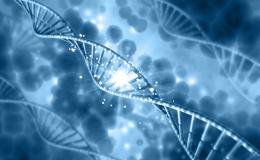Is Breast Cancer Hereditary?
October 7, 2020
Breast cancer is the second most common cancer in women in the United States, and with one in every eight women developing some form of invasive breast cancer in their lifetime,1 many people know at least one woman that has been diagnosed with the disease.

Genetic research has revealed that adverse mutations (changes) in a handful of different genes can greatly increase an individual’s risk of developing breast cancer, and importantly, these hereditary forms of breast cancer can be passed from an affected parent to their child. Here, in recognition of Breast Cancer Awareness Month this October, we highlight the prevalence of hereditary breast cancer and how individuals can better assess their own hereditary cancer risk.
Roughly five to ten percent of all breast cancer diagnoses are considered hereditary, or caused by an inherited gene mutation present at birth; other breast cancer diagnoses are considered sporadic, or caused by gene mutations acquired by an individual over time. The vast majority of hereditary breast cancer is attributed to mutations in the BRCA1 and BRCA2 genes, which adversely affect the DNA repair function of the BRCA1/2 gene products and increase an affected individual’s risk of developing breast, ovarian and other types of cancer. The hereditary cancer syndrome associated with BRCA1/2 gene mutations is called hereditary breast and ovarian cancer (HBOC) syndrome and affects men as well as women. To illustrate the increased cancer risk in individuals with HBOC, women with a BRCA1/2 mutation have about a 70% chance of developing breast cancer by the time they are 80 years old.2 While HBOC is the most common hereditary breast cancer syndrome, there are many other genes associated with hereditary breast cancer, including ATM, BARD1, BRIP1, CDH1, CHEK2, NBN, NF1, PALB2, PTEN, RAD51C, RAD51D, STK11 and TP53.3 Mutations in these genes are less prevalent than BRCA1/2 mutations and are associated with a lower risk of developing breast cancer than HBOC syndrome.
There are many different types of invasive breast cancer, or breast cancer that has spread beyond the site where it originally developed. The types of breast cancer differ in where the cancer originates, the appearance of and the presence or absence of hormone receptors on the cancer cells, and whether or not the cancer cells have too many copies of the HER2 gene. The types of invasive breast cancer and the percentage of diagnoses attributed to each type are listed below:
- Invasive ductal carcinoma - 70-80%
- Invasive lobular carcinoma - 10-15%
- Tubular carcinoma - 1-5%
- Mucinous (colloid) carcinoma - 2%
- Carcinomas with medullary features - <1%
- Invasive papillary carcinoma - <1%4
One type of breast cancer, carcinomas with medullary features, is typically a “triple-negative” tumor, meaning the cancer cells do not have estrogen receptors (ER-negative) or progesterone receptors (PR-negative) and do not have extra copies of the HER2 gene (HER2-negative). These triple-negative breast cancers are more commonly found in younger women and women with BRCA1 mutations. Currently, no other breast cancer types are associated with hereditary forms of breast cancer.
The prevalence of BRCA1/2 mutations in the general population is roughly one in every 400 people in the United States, but this probability increases to one in every 40 people of Ashkenazi Jewish heritage. Individuals with a family history of cancer, particularly on one side of the family, should talk to their physician about assessing their hereditary cancer risk to determine if hereditary cancer screening is right for them. Comprehensive hereditary cancer tests screen individuals for mutations in many genes associated with hereditary cancers, including breast cancer. Identifying the specific cancer gene mutation a patient carries allows clinicians to more efficiently monitor for cancers the affected patient is more likely to develop, which may facilitate earlier cancer detection and a better disease prognosis. The ExpedioTM Hereditary Cancer Screening test screens for mutations in breast cancer and other hereditary cancer genes, including every gene mentioned here. Click here to learn more about ExpedioTM or contact us with any questions you have regarding our genetic screening services.




